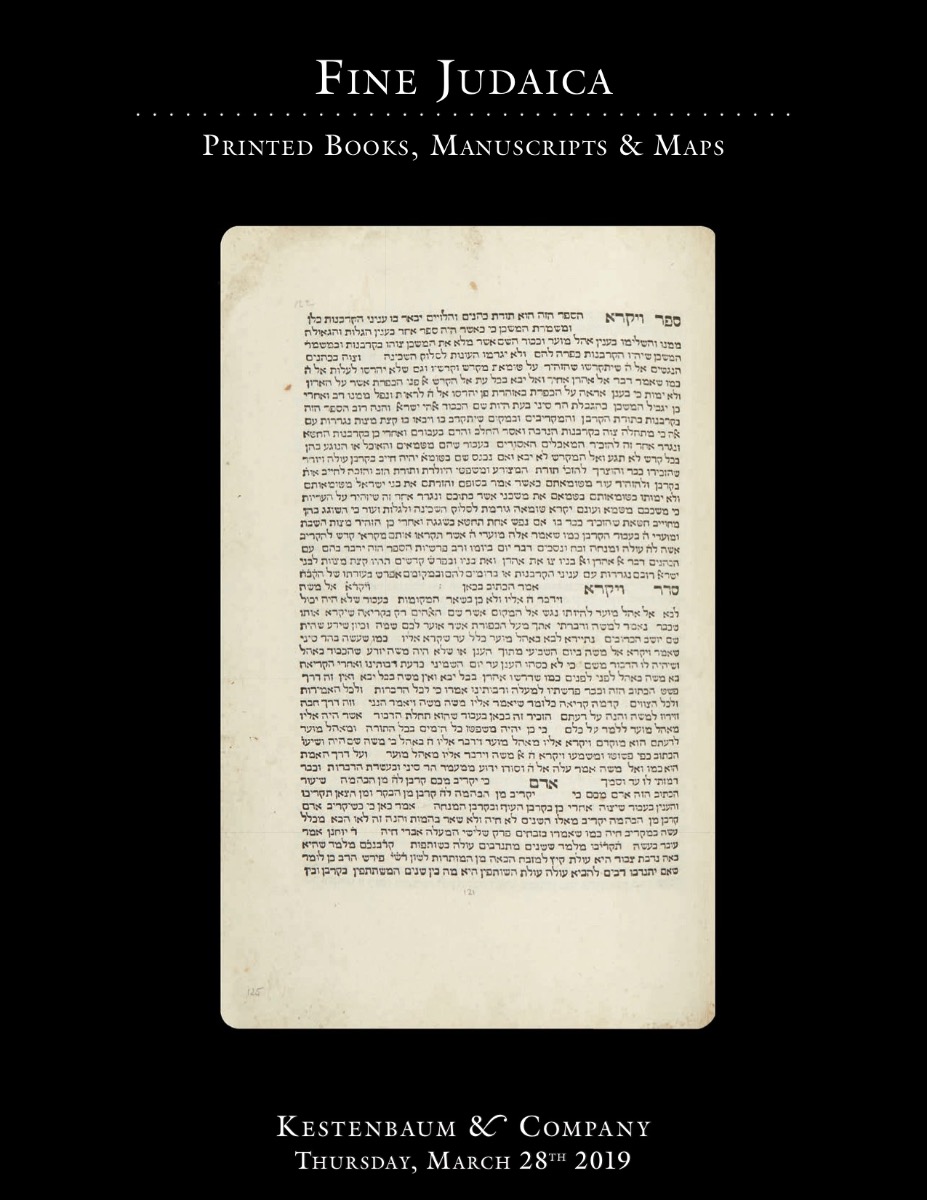Nathan, Moses N. (1807-1883). Thirteen Autograph Letters Signed, each written to <<Isaac Leeser>>. Text in English and Hebrew.

AUCTION 80 |
Thursday, March 28th,
2019 at 1:00 PM
The Valmadonna Trust Library: Further Selections from the Historic Collection. * Hebrew Printing in America. * Graphic & Ceremonial Art
Lot 132
(AMERICAN JUDAICA)
Nathan, Moses N. (1807-1883). Thirteen Autograph Letters Signed, each written to <<Isaac Leeser>>. Text in English and Hebrew.
Kington, Jamaica: 1856-63
Est: $6,000 - $9,000
PRICE REALIZED $32,000
These letters to Leeser, written by a traditionally-minded rabbi, honest of thought, who, although isolated in the Caribbean, displays much intelligence and insight.
Of Dutch origin, Moses N. Nathan (1801-83) was Rabbi in Kingston and St. Thomas for two decades before accepting a position in 1850 to serve the pulpit in New Orleans and later Charleston.
Select topics contained within these letters:
<<*>> Three letters touch upon the Civil War. In one, the war only months old and four years from its end, Nathan prays that “God grant that the war in your country may soon be at an end” and mentions “the frightful carnage at Bull Run.”
<<*>> Nathan tells Leeser dismal news about the state of Jews in Jamaica: “I must confess that I see nothing but poverty and dire distress for ⅔ of the Kingston Jews, who must go elsewhere in search of a living.” But Nathan also has pride in the accomplishment of some Jamaican Jews: “[My] eldest [nephew], who was 9 years last April, can translate nearly the whole chumash, and he is besides a pretty writer, a good English grammarian, Geographer, Historian, particularly Jewish, and Arithmetician. Not so bad for Jamaica, is it?”
<<*>> Nathan discusses his strongly negative opinion of the Reform trend. Thanking Leeser for “the bundle of newspapers [which] was a great treat,” he offers his assessment of six different titles, from “nothing great” to “less” to “very interesting and instructive.” Of Isaac M. Wise’s The Israelite, he writes “its principles are mischievous and its tendencies are to unsettle the Jewish mind, and divert it from the obedience to traditional usage into homage and worship of Lilienthals, Wises and Einhorns and their dicta.” Nathan resignedly sees success for Reform in the near future, but to no good end: “Let Reform synagogues multiply, organs increase, new prayer books and trashy hymns… supersede our present ritual and the psalms of David; another generation… will make bonfires [of them]… Judaism is immortal… Her enemies have not killed her… the principles of rationalism… will fail.”
<<*>> Nathan presents Leeser with the case of a young man who wishes to obtain a job in which he will not be forced to violate Shabbat. Nathan says he is “a very good, well-behaved boy and would not discredit the character you may give him.” Nathan explains that the lad, Samuel Mendes, has been forced to move to the United States so as not to be a burden to his widowed mother.
<<*>> Of tendencies in people, Nathan writes: “I do not like chutzpah and pretension; men who walk with their heads in the air, because they have no brains to weigh them down to an equilibrium with their contents.”
<<*>> Describing a certain rabbi, Nathan says “His sermons are bosh like himself.” In the last letter, dated June 1863, Nathan sadly remarks that Leeser should no longer call him by the title Reverend: “as a Rev. merchant is not recognized” (i.e., Nathan reluctantly went into business in order to support himself).
<<A fascinating group of letters, with a tremendous amount of information and local color. >>
